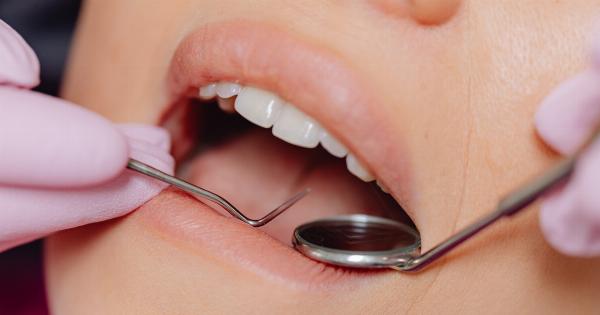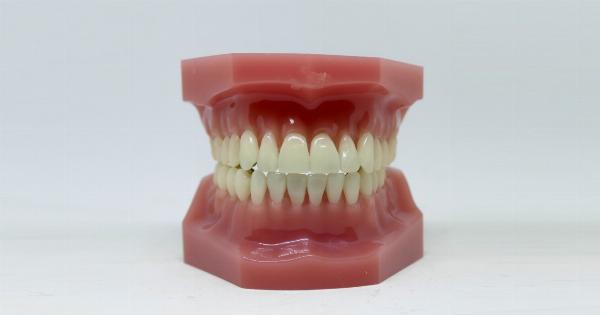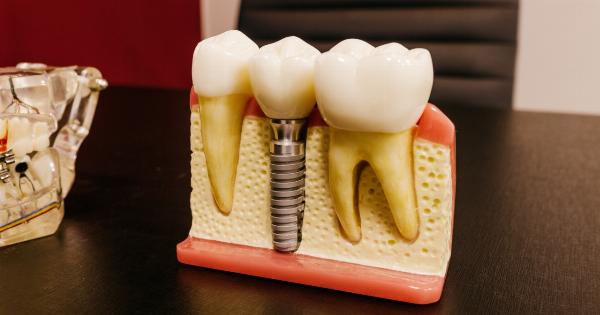Teeth are important components of human anatomy and play a crucial role in chewing food, speech, and enhancing appearance.
However, teeth may experience various conditions such as decay, injury, or developmental abnormalities that may affect their proper functioning. In some cases, children with dental problems may require medication to manage the condition. This article explores when medication should be given to children with teeth problems.
Different Types of Dental Problems in Children
Children may experience different types of dental problems resulting from various factors such as diet, oral hygiene, and injuries. Some of these conditions include:.
1. Dental Caries
Dental caries, commonly known as tooth decay, results from poor oral hygiene and a carbohydrate-rich diet.
These conditions allow bacteria to attack the enamel and form a cavity, which can progress to the inner tissues of the tooth, causing pain and infection.
2. Gum Disease
Gum disease, also known as periodontitis, results from bacterial infection and inflammation of the gums and tissues supporting the teeth. Symptoms include gum bleeding, swelling, and bad breath.
3. Tooth Sensitivity
Tooth sensitivity results from the exposure of the inner structures of the tooth, such as the dentin or pulp, to external factors such as cold, heat, or chewing.
This condition can cause discomfort or pain and may affect the child’s diet and oral hygiene.
4. Tooth Eruption
Tooth eruption is a natural process whereby the child’s teeth grow and emerge from the gums. However, some children may experience delayed or abnormal eruption, causing pain or discomfort.
When Should Medication Be Given to Children with Teeth Problems?
Medication should be given to children with teeth problems depending on the type and severity of the condition. Here are some instances where medication may be necessary:.
1. Dental Caries
Antibiotics: Antibiotics such as amoxicillin or penicillin may be prescribed to children with dental caries if the decay has spread to the inner tissues of the tooth, causing infection.
The medication helps to kill the bacteria causing the infection and prevent its spread to other parts of the body.
Analgesics: Analgesics such as acetaminophen or ibuprofen may be recommended to alleviate pain or discomfort associated with dental caries. These medications can help the child to eat and drink comfortably and improve their quality of life.
2. Gum Disease
Antibiotics: Antibiotics such as metronidazole or tetracycline may be prescribed to children with gum disease to kill the bacteria causing the infection.
The medication may be given orally or applied topically depending on the severity of the condition.
Antiseptics: Antiseptics such as chlorhexidine or hydrogen peroxide may be recommended to kill the bacteria and reduce inflammation in the gums. The solutions may be given as mouthwash or applied directly to the affected area.
3. Tooth Sensitivity
Fluoride: Fluoride is a mineral that helps to strengthen teeth and prevent decay. Children with tooth sensitivity may be given fluoride supplements or applied topically on the affected teeth to alleviate the condition.
Desensitizing agents: Desensitizing agents such as potassium nitrate or strontium chloride can be applied to the affected teeth to block the pain signals and reduce discomfort.
4. Tooth Eruption
Analgesics: Analgesics such as acetaminophen or ibuprofen may be recommended to alleviate pain or discomfort associated with tooth eruption. These medications can help the child to eat, drink, and sleep comfortably.
Teething gels: Teething gels containing benzocaine or lidocaine may be applied topically to the gums to numb the pain and reduce discomfort.
However, parents should be cautious when using these products on children below two years old as they may cause adverse reactions such as seizures.
Conclusion
When medication should be given to children with teeth problems depends on the type and severity of the condition.
In most cases, antibiotics, analgesics, antiseptics, fluoride, and desensitizing agents are used to manage dental problems such as caries, gum disease, sensitivity, and tooth eruption. However, parents should consult a dental professional to get an accurate diagnosis and appropriate treatment for their child’s dental problem.

























